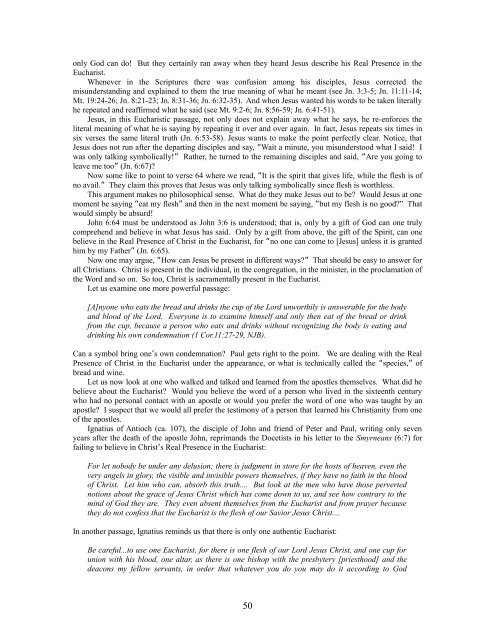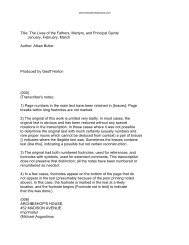Ecce Fides - Pillar of Truth - St. Patrick's Basilica
Ecce Fides - Pillar of Truth - St. Patrick's Basilica
Ecce Fides - Pillar of Truth - St. Patrick's Basilica
Create successful ePaper yourself
Turn your PDF publications into a flip-book with our unique Google optimized e-Paper software.
only God can do! But they certainly ran away when they heard Jesus describe his Real Presence in the<br />
Eucharist.<br />
Whenever in the Scriptures there was confusion among his disciples, Jesus corrected the<br />
misunderstanding and explained to them the true meaning <strong>of</strong> what he meant (see Jn. 3:3-5; Jn. 11:11-14;<br />
Mt. 19:24-26; Jn. 8:21-23; Jn. 8:31-36; Jn. 6:32-35). And when Jesus wanted his words to be taken literally<br />
he repeated and reaffirmed what he said (see Mt. 9:2-6; Jn. 8:56-59; Jn. 6:41-51).<br />
Jesus, in this Eucharistic passage, not only does not explain away what he says, he re-enforces the<br />
literal meaning <strong>of</strong> what he is saying by repeating it over and over again. In fact, Jesus repeats six times in<br />
six verses the same literal truth (Jn. 6:53-58). Jesus wants to make the point perfectly clear. Notice, that<br />
Jesus does not run after the departing disciples and say, “Wait a minute, you misunderstood what I said! I<br />
was only talking symbolically!” Rather, he turned to the remaining disciples and said, “Are you going to<br />
leave me too” (Jn. 6:67)?<br />
Now some like to point to verse 64 where we read, “It is the spirit that gives life, while the flesh is <strong>of</strong><br />
no avail.” They claim this proves that Jesus was only talking symbolically since flesh is worthless.<br />
This argument makes no philosophical sense. What do they make Jesus out to be? Would Jesus at one<br />
moment be saying “eat my flesh” and then in the next moment be saying, “but my flesh is no good?” That<br />
would simply be absurd!<br />
John 6:64 must be understood as John 3:6 is understood; that is, only by a gift <strong>of</strong> God can one truly<br />
comprehend and believe in what Jesus has said. Only by a gift from above, the gift <strong>of</strong> the Spirit, can one<br />
believe in the Real Presence <strong>of</strong> Christ in the Eucharist, for “no one can come to [Jesus] unless it is granted<br />
him by my Father” (Jn. 6:65).<br />
Now one may argue, “How can Jesus be present in different ways?” That should be easy to answer for<br />
all Christians. Christ is present in the individual, in the congregation, in the minister, in the proclamation <strong>of</strong><br />
the Word and so on. So too, Christ is sacramentally present in the Eucharist.<br />
Let us examine one more powerful passage:<br />
[A]nyone who eats the bread and drinks the cup <strong>of</strong> the Lord unworthily is answerable for the body<br />
and blood <strong>of</strong> the Lord. Everyone is to examine himself and only then eat <strong>of</strong> the bread or drink<br />
from the cup, because a person who eats and drinks without recognizing the body is eating and<br />
drinking his own condemnation (1 Cor.11:27-29, NJB).<br />
Can a symbol bring one’s own condemnation? Paul gets right to the point. We are dealing with the Real<br />
Presence <strong>of</strong> Christ in the Eucharist under the appearance, or what is technically called the “species,” <strong>of</strong><br />
bread and wine.<br />
Let us now look at one who walked and talked and learned from the apostles themselves. What did he<br />
believe about the Eucharist? Would you believe the word <strong>of</strong> a person who lived in the sixteenth century<br />
who had no personal contact with an apostle or would you prefer the word <strong>of</strong> one who was taught by an<br />
apostle? I suspect that we would all prefer the testimony <strong>of</strong> a person that learned his Christianity from one<br />
<strong>of</strong> the apostles.<br />
Ignatius <strong>of</strong> Antioch (ca. 107), the disciple <strong>of</strong> John and friend <strong>of</strong> Peter and Paul, writing only seven<br />
years after the death <strong>of</strong> the apostle John, reprimands the Docetists in his letter to the Smyrneans (6:7) for<br />
failing to believe in Christ’s Real Presence in the Eucharist:<br />
For let nobody be under any delusion; there is judgment in store for the hosts <strong>of</strong> heaven, even the<br />
very angels in glory, the visible and invisible powers themselves, if they have no faith in the blood<br />
<strong>of</strong> Christ. Let him who can, absorb this truth.... But look at the men who have those perverted<br />
notions about the grace <strong>of</strong> Jesus Christ which has come down to us, and see how contrary to the<br />
mind <strong>of</strong> God they are. They even absent themselves from the Eucharist and from prayer because<br />
they do not confess that the Eucharist is the flesh <strong>of</strong> our Savior Jesus Christ....<br />
In another passage, Ignatius reminds us that there is only one authentic Eucharist:<br />
Be careful...to use one Eucharist, for there is one flesh <strong>of</strong> our Lord Jesus Christ, and one cup for<br />
union with his blood, one altar, as there is one bishop with the presbytery [priesthood] and the<br />
deacons my fellow servants, in order that whatever you do you may do it according to God<br />
50






